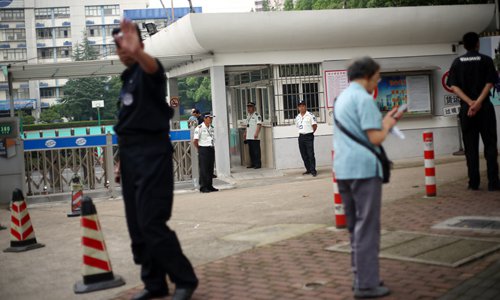
Security staff members stand guard outside the Shanghai World Foreign Language Primary School after two children were killed by Huang Yichuan with a knife on June 29. (Photo: IC)
Huang Yichuan, a controversial suspect who brutally killed two primary school students in June in Shanghai, stood on trial on December 6, with prosecutors calling for severe punishment, even though he was diagnosed with schizophrenia.
The case had caused a controversial discussion on Chinese social media over the identification of mental diseases and antisocial personalities in criminal cases. The legal regulations concerning people with mental illness and antisocial personalities are totally different.
In addition, when a defendant claims they have a mental disease, there is room for suspicion that the disease is being used as an excuse to help the suspect escape punishment.
The trial was held in the Shanghai First Intermediate People's Court. The judgment will be pronounced at a later date, a news site under the Supreme People's Court of China reported.
Huang has confessed to the crime in court, so the heart of the controversy is whether the disease can be a reason to sentence him leniently.
Chinese Criminal Law stipulates that any person with a mental illness who does not lose completely the ability to recognize or control his own conduct and commits a crime shall bear criminal responsibility, but he may be given a lighter or mitigated punishment.
Meanwhile, according to technical specifications for judicial appraisal released in 2011, suspects with antisocial personalities should be treated as having full capacity for criminal responsibility.
Zhai Jianxin, a lawyer representing the victims, told the news site Caixin that Huang's behavior should be understood as revenge against society, indicating that he had an antisocial personality.
This means Huang should bear full criminal responsibility even he totally lost control of himself at the time of the crime, according to Zhai.
Even if Huang was diagnosed as having a diminished sense of responsibility at the time of the crime, he should still be sentenced to death for the brutal crime as the law said suspects in such case "may be" leniently punished, but it is not necessary, Zhai said.
Controversial behaviors
Huang, from Suining, Central China's Hunan Province, came to Shanghai on June 6 and bought a knife six days later.
He chose pupils from the Shanghai World Foreign Language Primary School as a target after watching the area for many days.
Huang put the knife in a plastic bag, and came to the school on the morning of December 28. When the school let out at noon, he followed three 4th grade students, surnamed Tan, Fei and Jin.
Huang attacked the three when they were about 130 meters away from the school. He thought the time was ripe because the children were both far away from families and school security guards.
Tan and Fei died after the attack. Jin and Tan's mother were slightly injured. Huang was caught at the scene by school security guards and people passing by.
He was diagnosed as a schizophrenic with a diminished sense of responsibility at the time of the crime, according to an accrediting body commissioned by the Shanghai police.
However, prosecutors argued in court that Huang had committed the crime of homicide due to his sinister motives, brutal killing of primary school students, careful planning before the crime, and the grave social impact of the case, according to chinacourt.org.
Prosecutors showed Huang's notes as evidence to the court. The notes included pictures and a self-drawn roadmap of several primary schools and kindergartens in Shanghai, Guangzhou, Beijing and Qingdao.
Huang looked relaxed, shaking his head now and then, Caixin reported on December 6, citing an anonymous insider.
He repeatedly defended himself in court by saying he was not taking revenge on society. However, he also said that he was always bullied by those he was not able to fight so he must find someone else, as he could not be bullied in vain.
Judicial confusion
As to Zhai's insistence that Huang had an antisocial personality, Kang Yong, Huang's lawyer, told Caixin that it should be up to the experts to decide which disease Huang has.
"Huang's mode of thought is different from ours. Normally we would fight back to whoever bullies us, but Huang thinks that he should go after kids," Kang said.
The accreditation body tested Huang twice before reaching the conclusion. The report said that Huang suffered from hallucinations, which is a clinical symptom of schizophrenia. He always heard voices saying things like "you are weak," and "you cannot find a job," according to Caixin.
However, an expert who took part in the accreditation of Huang and testified in the trail was quoted as saying, "Huang's disease does not necessarily relate to his criminal behaviors."
Mo Shaoping, a law professor at the Central University of Finance and Economics, told the Global Times on Wednesday that the accreditation process of mental disease in criminal cases can be very complex, requiring highly qualified and experienced experts.
However, such experts cannot be available for every case, Mo noted, adding that China still lacks a complete evaluation system and techniques to conduct the evaluation.


